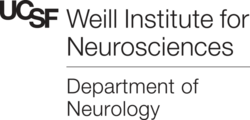About
Program Description
The UCSF Behavioral Neurology Training Program (BNTP) is a two-year program designed to prepare physicians for a career that focuses on research and care for patients with cognitive and behavioral impairment due to neurological disease. The training is based on the principles of behavioral neurology, particularly brain-behavior relationships, and understanding the use of additional testing to fully characterize a patient’s problem, including many experimental approaches, from experimental cognitive testing to advanced imaging. The BNTP mostly trains neurologists but has trained physicians in other relevant fields, such as psychiatry and geriatric medicine, and welcomes applications from these disciplines. The program is certified by the United Council on Neurologic Specialties (UCNS). Fellow supervision and evaluation are provided by the Program Director Howard Rosen, MD, and Co-Director Bruce Miller, MD (Director of the Memory and Aging Center), in addition to research advisors chosen by the trainee.
Mission
Our program aims to create a diverse workforce of leaders focused on preventing and treating brain disorders that cause cognitive and behavioral difficulties to minimize the impact of these disorders in people from all cultures and regions of the world. We stress that understanding the clinical presentations of brain disorders is a bedrock principle for all other aspects of research and care. Through our extensive clinical and research activities, we provide exposure to a diverse array of patients affected by these disorders and pair this with exposure to multiple approaches for advancing knowledge about diagnosis and care.
Details
Training occurs through participation in the multidisciplinary Memory and Aging (MAC) Clinic as well as the clinical research program dedicated to improving the diagnosis and treatment of cognitive and behavioral disorders resulting from neurodegenerative disease. In the first year, fellows spend about one and one-half days seeing patients in the MAC clinic. Each assessment is supervised by a MAC attending. Concurrently, fellows rotate through research programs focused on aging, Alzheimer’s disease, frontotemporal dementia and related disorders, rapidly progressive dementia, and other conditions, where they serve a core function of clinical characterization. Participation in these research programs ensures exposure to a wide variety of clinical presentations, while familiarizing them with the apparatus and procedures necessary for clinical research in behavioral neurology. These activities build expertise in: 1) Principles of brain-behavior correlation, 2) Clinical manifestations of brain disorders affecting cognition and behavior, in particular, neurodegenerative diseases, 3) Development of clinical skills for evaluation of cognitive and behavioral abnormalities, including interpretation of neuropsychological and behavioral data.
This clinical experience is critical for a research career in behavioral neurology, as clinical assessment is at the core of diagnosis for both clinical and research purposes, and clinical problems help set the goals for a research agenda. Clinical experience at the MAC is supplemented with weekly didactic conferences, which include exposure to topics such as health economics, policy, and biomarker research while ensuring appropriate grounding in basic science, and leadership training. Balanced multidisciplinary mentoring from both basic science and clinical research faculty is available.
During the second year, clinical activities are reduced (about one to two days per week), with the rest of the time being devoted to research.
Research Opportunities
The MAC maintains strong collaborative relationships with other clinical programs and with basic scientists ranging from molecular biologists to cognitive neuroscientists both at UCSF and other Bay Area institutions. Research conducted through the MAC uses many techniques, including extensive clinical assessments, experimental paradigms gleaned from neuroscience and psychology, functional and structural neuroimaging, genetic studies, and ‘omics’ approaches. These techniques are applied to many clinical populations, including patients with mild cognitive impairment, Alzheimer’s disease, frontotemporal dementia, and parkinsonian dementias. This stimulating, diverse clinical and research environment gives trainees broad exposure to current research relevant to behavioral neurology and access to a wide variety of research mentors.
How to Apply
Prerequisites
Information to Provide
Application Process and Dates
Contact Us
Program Director
Howie Rosen, MD
[email protected]
Program Coordinator
Sabrina Ho
[email protected]
For more information, please call 415.476.5591 or email [email protected].
Resources
- Atlantic Fellow for Equity in Brain Health Program at the Global Brain Health Institute (GBHI)
- Postdoctoral Program in Brain Health Equity
- Research Education Component of the UCSF Alzheimer’s Disease Center
- Neuropsychology Training Program
- Neurobehavioral Rotation Program
- International Visiting Scholars
- US Visiting Students
